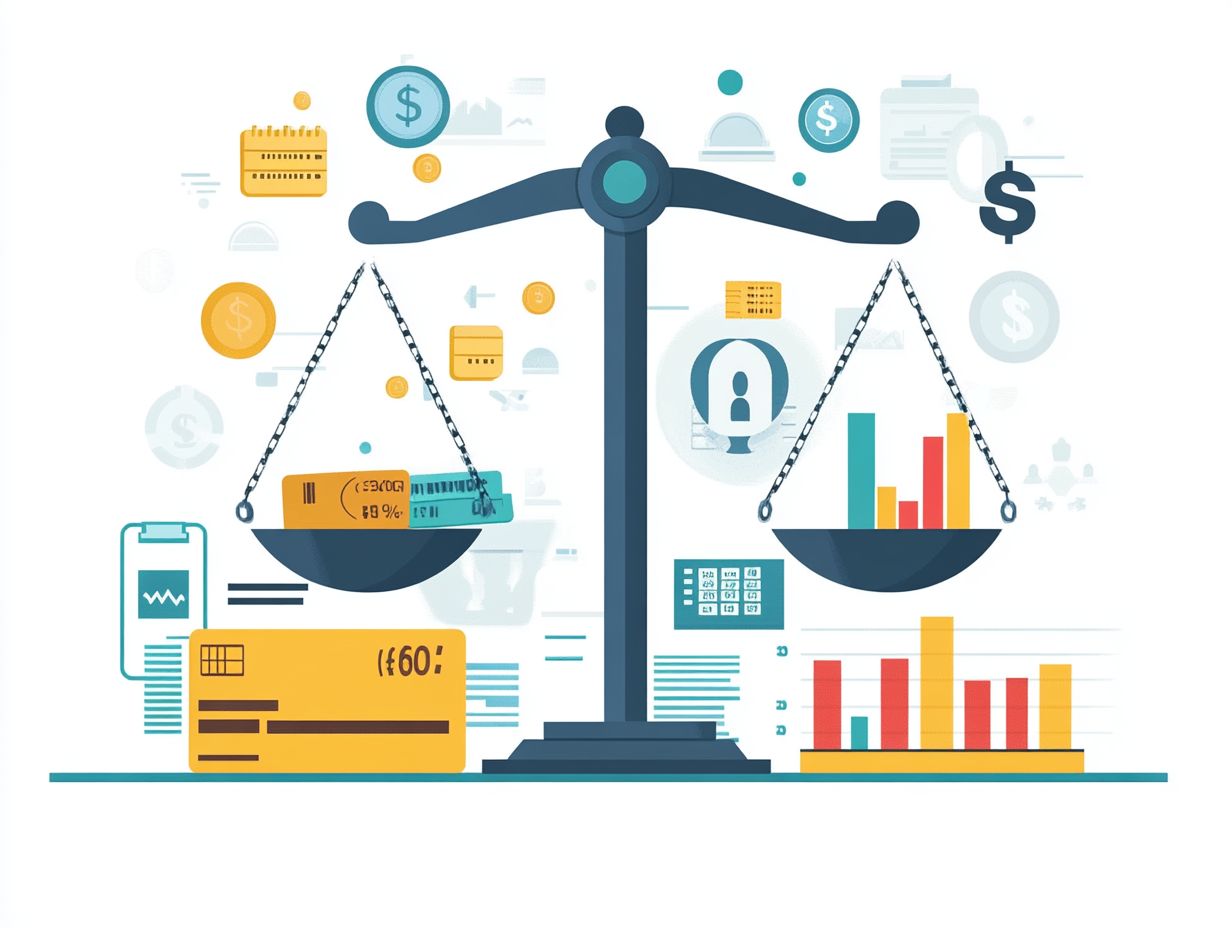The Connection Between Credit Scores and Interest Rates
Understanding credit scores is essential for anyone navigating the intricate financial landscape, as these scores significantly influence your borrowing power.
This article breaks down the fundamentals, beginning with a clear definition of what a credit score is and the various factors that affect it. You ll discover how these scores impact interest rates, why they matter to lenders, and practical tips for enhancing your score.
We ll also share strategies for managing higher interest rates if your score is low.
Get ready to take charge of your financial future with these insights!
Contents
- Key Takeaways:
- Understanding Credit Scores
- How Credit Scores Impact Interest Rates
- Improving Your Credit Score
- Managing Interest Rates with a Lower Credit Score
- Frequently Asked Questions
- What is the connection between credit scores and interest rates?
- How do credit scores affect interest rates?
- Ready to improve your credit score for better rates?
- What is considered a good credit score?
- Can I improve my credit score to get a better interest rate?
- Are there any other factors besides credit score that can impact interest rates?
Key Takeaways:

- A credit score is a numerical representation of an individual’s creditworthiness and is used by lenders to determine interest rates for loans and credit cards.
- Lenders consider credit scores an indicator of an individual’s ability to repay a loan. A higher credit score can lead to lower interest rates.
- To improve credit scores and potentially lower interest rates, pay bills on time, keep credit card balances low, and monitor credit reports for errors.
Understanding Credit Scores
Understanding credit scores is crucial for anyone navigating the financial landscape, especially when it comes to borrowing money for home loans or other significant purchases. A credit score, typically ranging from 300 to 850, serves as a number that shows how good you are at paying back money, as assessed by various credit bureaus like Experian, Equifax, and TransUnion.
This score indicates how likely you are to repay your debts and plays a significant role in determining the mortgage rates or loan terms offered by lenders. By grasping the intricacies of credit scoring, you can take command of your financial future with confidence.
What is a Credit Score?
A credit score is a number that shows how good you are at paying back money, with the FICO score being the most commonly relied upon by lenders to gauge the risks associated with lending you money.
This score is crucial in determining whether you qualify for loans or credit cards, and it directly influences the interest rates lenders are willing to offer you. It s calculated using information from your credit report, which outlines your borrowing history, payment habits, and outstanding debts. Lenders carefully examine these reports to assess the risk of extending credit, making your credit score a pivotal factor in their decision-making process.
A higher score often opens the door to better loan terms and more borrowing opportunities, while a lower score can considerably narrow your options.
Factors that Affect Credit Scores
Several key factors can affect your credit score, with payment history and total debt being among the most significant components that lenders consider when evaluating your creditworthiness.
Understanding these factors gives you the power to take control of your financial health. For instance, making consistent on-time payments can enhance your payment history, which accounts for a substantial portion of your credit score. The total debt you carry, including loans and credit cards, plays a crucial role keeping this amount manageable can positively influence your score.
Credit utilization is the amount of your current debt compared to your available credit. To maintain a healthy score, this ratio should ideally stay below 30%.
Frequent credit inquiries can signal financial distress, so it’s wise to be cautious about applying for new credit.
By monitoring these elements and adopting sound financial practices, you can work toward improving your credit rating.
How Credit Scores Impact Interest Rates

Credit scores significantly influence the interest rates associated with loans, especially mortgages. Lenders depend on these scores to assess your likelihood of repayment and the overall risk of lending money.
A higher credit score opens the door to attractive loan terms, such as lower yearly interest rates. In contrast, a lower score can lead to elevated interest rates and less favorable fixed-rate mortgage offers.
Understanding how credit scores impact interest rates helps you navigate the financing landscape confidently. This knowledge allows you to make informed decisions that align with your financial goals.
Why Credit Scores Matter to Lenders
For lenders, credit scores are crucial indicators of your ability to repay loans. They directly influence decisions on loan approvals and the terms they re willing to offer.
This numerical representation reflects your historical financial behavior, revealing patterns in repayment and potential risk. By relying on these scores, lenders can assess the likelihood of default, thus safeguarding their investments. Higher scores often lead to more favorable interest rates and loan terms, highlighting the importance of maintaining a strong credit history.
Understanding the factors that contribute to credit scores is vital for you as a borrower seeking competitive financing options. This knowledge ultimately impacts your broader financial health and opportunities.
How Credit Scores Affect Interest Rates
Credit scores play a pivotal role in determining the interest rates you receive. Mortgage lenders typically offer more favorable rates to individuals with good scores. In contrast, those with poor scores may face higher APRs.
This disparity is significant. Even a minor difference in the interest rate can lead to profound financial consequences over the life of a loan. For example, if your credit score is 760, you might secure a mortgage with an APR of 3.5%. Conversely, someone with a score of 620 could end up with an APR around 5.5%.
Over a 30-year term, this can mean thousands of dollars in additional interest payments. Act quickly to ensure you re in the best position to secure favorable terms.
To enhance your chances of securing a better rate, focus on these strategies:
- Pay down existing debts
- Maintain low credit utilization (the amount of your available credit you’re using)
- Make timely payments
Regularly check your credit reports for errors. This is a crucial step before applying for a mortgage.
Improving Your Credit Score
Improving your credit score is essential for enhancing your financial future. You can achieve this through strategic debt management and responsible credit utilization, both of which significantly influence your ability to secure favorable loan terms.
Tips for Boosting Your Credit Score

To effectively boost your credit score, start by regularly checking your credit report for errors. Ensure you maintain a timely payment history and practice sound debt management with your credit card providers.
Act quickly to correct any inaccuracies that could adversely affect your financial standing. A consistent track record of on-time payments is the foundation of a healthy credit score, showcasing your reliability to lenders.
Wise credit management involves keeping your credit card balances low and avoiding maxing out your cards. High utilization can raise red flags. Consider diversifying your credit mix by incorporating installment loans (loans repaid over time with regular payments, like car loans) or revolving accounts. This can enhance your profile and positively influence your overall score.
By developing a strategic approach to these practices, you can elevate your credit score and nurture long-term financial health. Start implementing these tips today for a better financial future!
Managing Interest Rates with a Lower Credit Score
Navigating interest rates with a lower credit score can be challenging. However, by employing effective negotiation strategies and seeking temporary relief from lenders, you can secure more favorable loan terms and significantly lower mortgage interest rates.
Strategies for Managing Higher Interest Rates
To navigate higher interest rates effectively, take the time to understand your options. This includes working with mortgage lenders to negotiate better loan terms and exploring refinancing opportunities to reduce long-term costs.
By being proactive, you can potentially lower your monthly payments and overall interest obligations. It s crucial to grasp how interest rates impact your credit score. Even small adjustments can significantly enhance your chances of loan approval.
Regularly reviewing your credit report allows you to identify areas for improvement, making you a more attractive candidate to lenders.
Establishing a budget that prioritizes debt repayment is vital for maintaining a healthy credit profile. This puts you in a stronger position when negotiating loans.
Frequently Asked Questions
What is the connection between credit scores and interest rates?

The connection between credit scores and interest rates is that lenders use credit scores to determine the interest rate they will offer to a borrower. A higher credit score typically results in a lower interest rate, while a lower credit score can lead to a higher interest rate. Additionally, understanding the relationship between credit scores and insurance rates can further clarify how credit impacts overall financial decisions.
How do credit scores affect interest rates?
Credit scores can affect interest rates in two main ways. First, a higher credit score can lead to a lower interest rate, as lenders see borrowers with higher credit scores as less risky. Second, a lower credit score can result in a higher interest rate, as lenders may view borrowers with lower credit scores as more likely to default on a loan.
Ready to improve your credit score for better rates?
Yes, your credit score can greatly impact your ability to secure a loan with a good interest rate. Lenders use credit scores to assess the risk of lending to a borrower, so a low credit score may make it more difficult to get a loan with favorable interest rates.
What is considered a good credit score?
A good credit score is typically above 700. This indicates that a borrower has a history of responsible borrowing and is more likely to make payments on time and in full. However, the specific range for a good score may vary by lender.
Can I improve my credit score to get a better interest rate?
Yes! Start improving your credit score today for better rates tomorrow. Ways to enhance your credit score include paying bills on time, keeping credit card balances low, and regularly checking your credit report for errors.
Are there any other factors besides credit score that can impact interest rates?
Yes, other factors can impact interest rates. Lenders may also consider factors such as income, employment history, and the amount of money you owe compared to what you earn when determining the interest rate for a loan.






